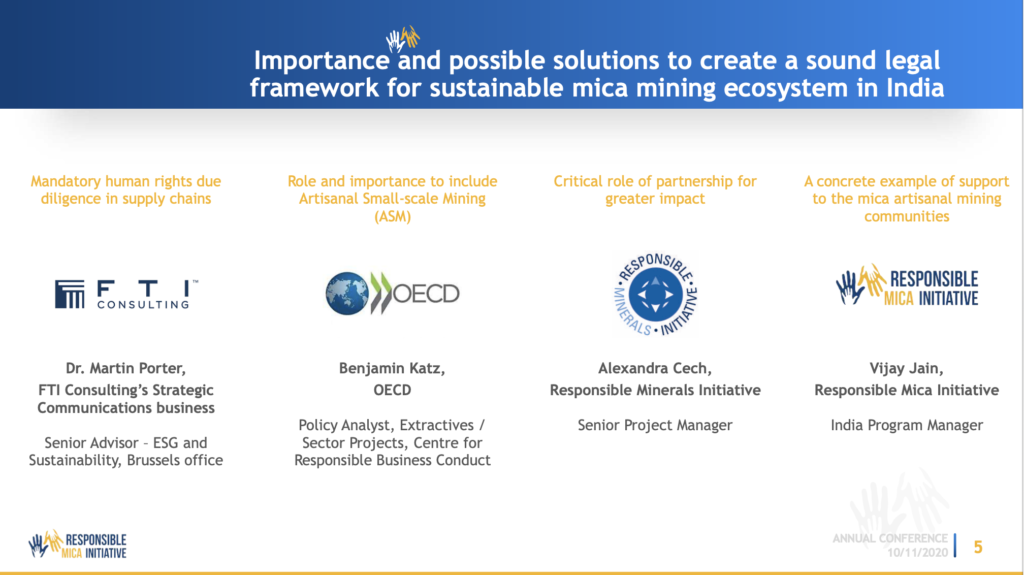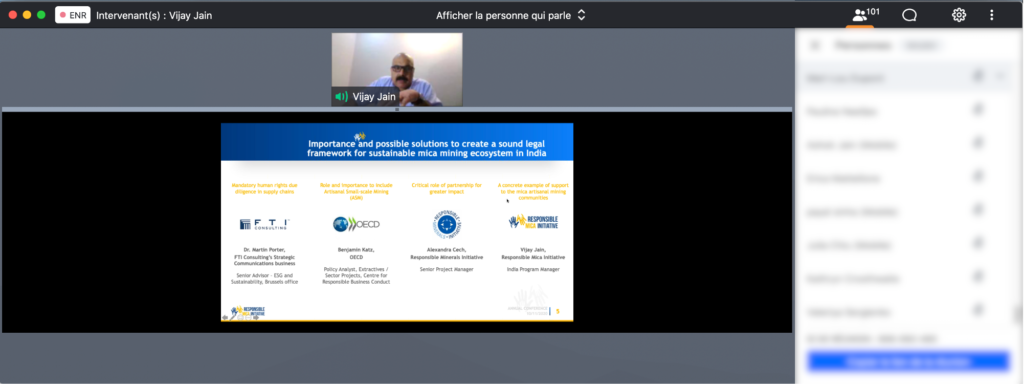
Covid-19 pandemic and its consequences for mica-dependent communities in Bihar and Jharkhand were naturally at the heart of all discussions. Beyond its non-questionable impact on the year 2020, the two events also presented the progress made by the Initiative in this tough context, as well as the next milestones to come for RMI. A panel composed by key experts and partners, focusing on the importance of creating a livable legal framework for sustainable mica mining ecosystem in India, brought additional perspectives and examples, for RMI to build these next steps.
Partners and experts exchanged on solutions to implement a livable legal framework for sustainable mica ecosystem in India
Confirmed momentum for new regulation towards proper Human Rights due diligence
Dr. Martin Porter (FTI Consulting) confirmed the current momentum that would benefit to due diligence and sustainable sourcing of minerals, the new EU regulation being at the forefront of this wave of regulations that is likely not only to impact European countries, but also to “have a global relevance”, including in India. Dr. Porter raised multiple uncertainties surrounding this new regulation. About the scope first, in terms of geography, of companies (will small and medium enterprises be included?), of criteria (will environment, social criteria be included?). Whether it will be mandatory, and related to this, will sanctions be applied to non-compliant companies. Finally, about data collection and how to harmonize data collection, especially with regards to environmental and social criteria? Dr. Porter concluded by acknowledging that “the work of the Responsible Mica Initiative is key getting the right response to the issue”.
The key role of multi-stakeholders partnerships to promote responsible sourcing through transparency and sustainability
Alexandra Cech (Responsible Minerals Initiative) emphasized the importance of multi-stakeholder partnerships to promote transparency, sustainability and responsible sourcing, in a long-term perspective. She showcased several examples to prove their efficiency, including their current partnerships with the Responsible Mica Initiative and the Global Battery Alliance (GBA). Lessons learned following GBA experience were shared as well, among which the importance of coordinating all actors alongside the supply chain thanks to harmonized language, tools and communication; the need “to focus on legitimacy and acceptability as opposed to focusing on the requirement itself”; the importance of demonstrating ability to monitor the progress of the initiative in order to support scaling up best practices.
How crucial it is to include artisanal and small-scale mining communities while mitigating risks related to minerals supply chains
Benjamin Katz (OECD), introduced the OECD guidance for due diligence and how it impacts artisanal and small-scale mining (ASM) communities. He first emphasized the significance of ASM – that represents 90% of the workforce of the global mining industry – and the efficiency of addressing issues encountered by ASM communities following a multi-stakeholder approach, recalling that “the traditional compliance binary perspective aiming for the absence of risk is not a goal of the due diligence guidance”. “Avoiding ASM is not a valid nor workable risk mitigation strategy because it is simply ineffective”, since it hides the problems instead of addressing them, exposing ASM workers in many cases to extorsion and other human rights risks. He confirmed that ASM formalization is a great multi-risk mitigation strategy, while going beyond the site and looking at how to strengthen child protection systems for example remains key in mitigating risks. B. Katz concluded by sharing successes in the gems or tin industries that would make sense economically for ASM workers and downstream companies, on top of being effective communication tools.
And how it would translate on the ground, an Indian perspective
Vijay Jain (Responsible Mica Initiative) concluded the panel by sharing his close vision of what is happening on the ground for Indian mica-communities, and how the Responsible Mica Initiative is pursuing its objective to seeing a livable legal framework be created while ensuring the basics needs for mica ASM communities are met. Mr. Jain emphasized the need to share responsibilities among actors of the supply chain. And while regulation is key to mitigate risks, especially upstream when it comes to ASM workers, a particular focus should be placed on avoiding overregulation. Aligned with B. Katz, he confirmed that avoiding ASM is not the solution, and even that focusing on ASM workers in India would be a great opportunity to participate to communities’ development in Bihar and Jharkhand.
RMI wishes to thank once again all panelists, who have been supportive of RMI’s work from the very beginning, and who again dedicated time to share their ideas and experience, an incredible source of food for thoughts to build RMI’s next steps, getting larger inspiration and perspective than from sole mica supply chain.
